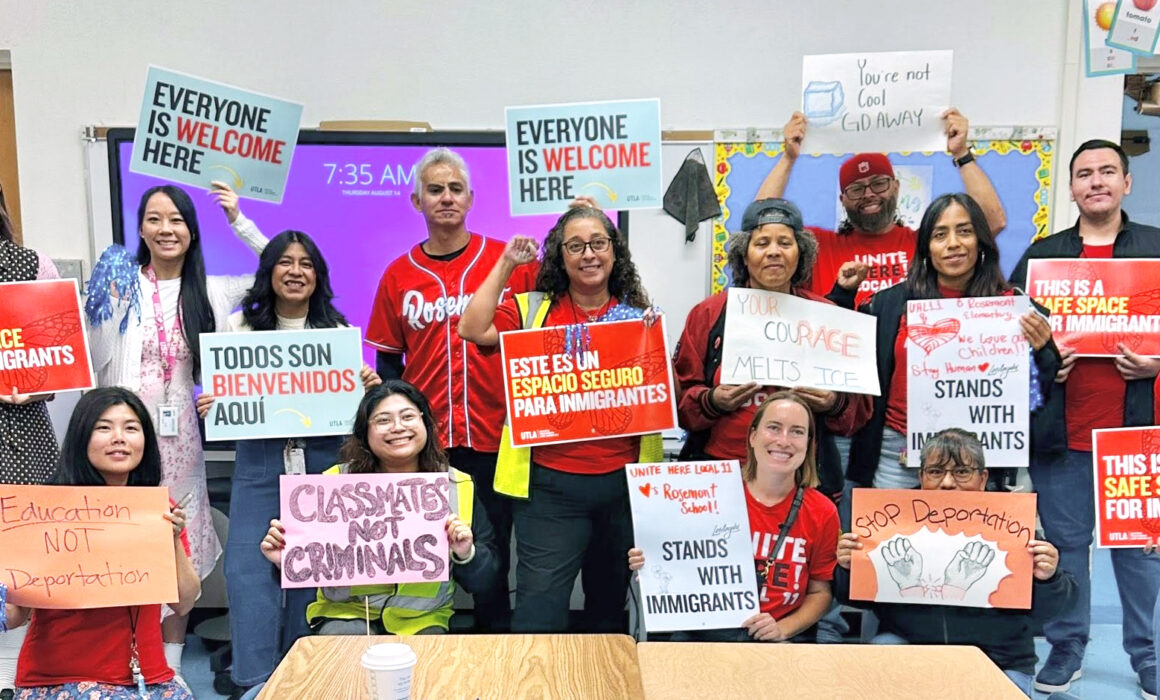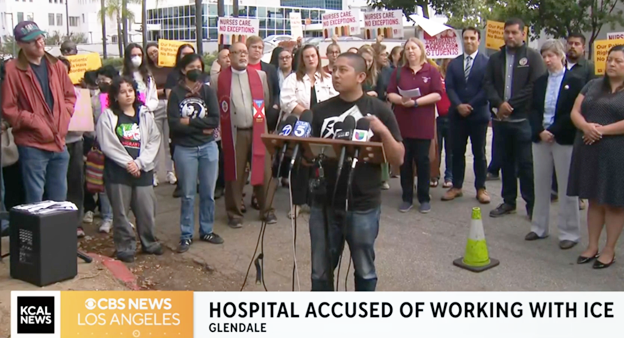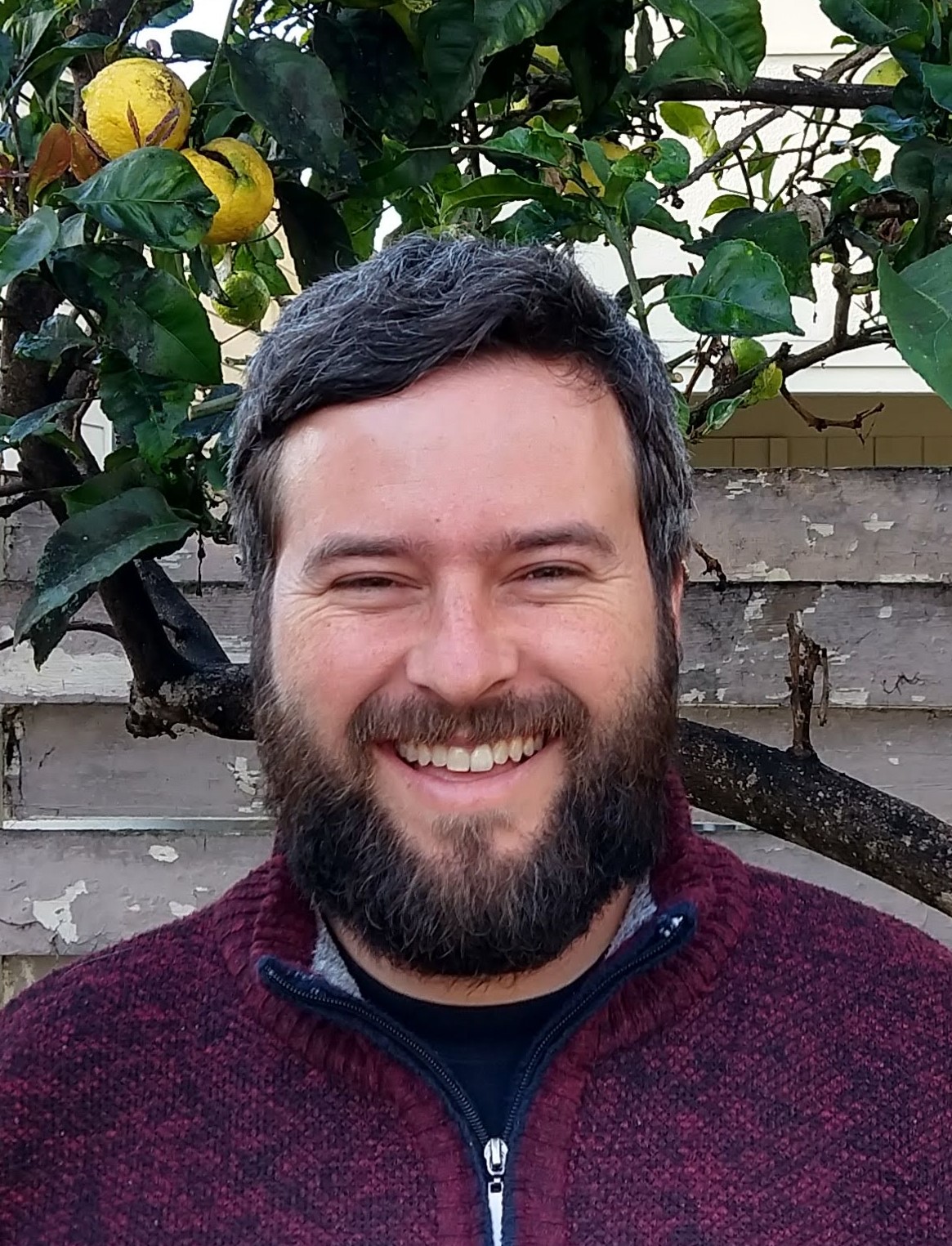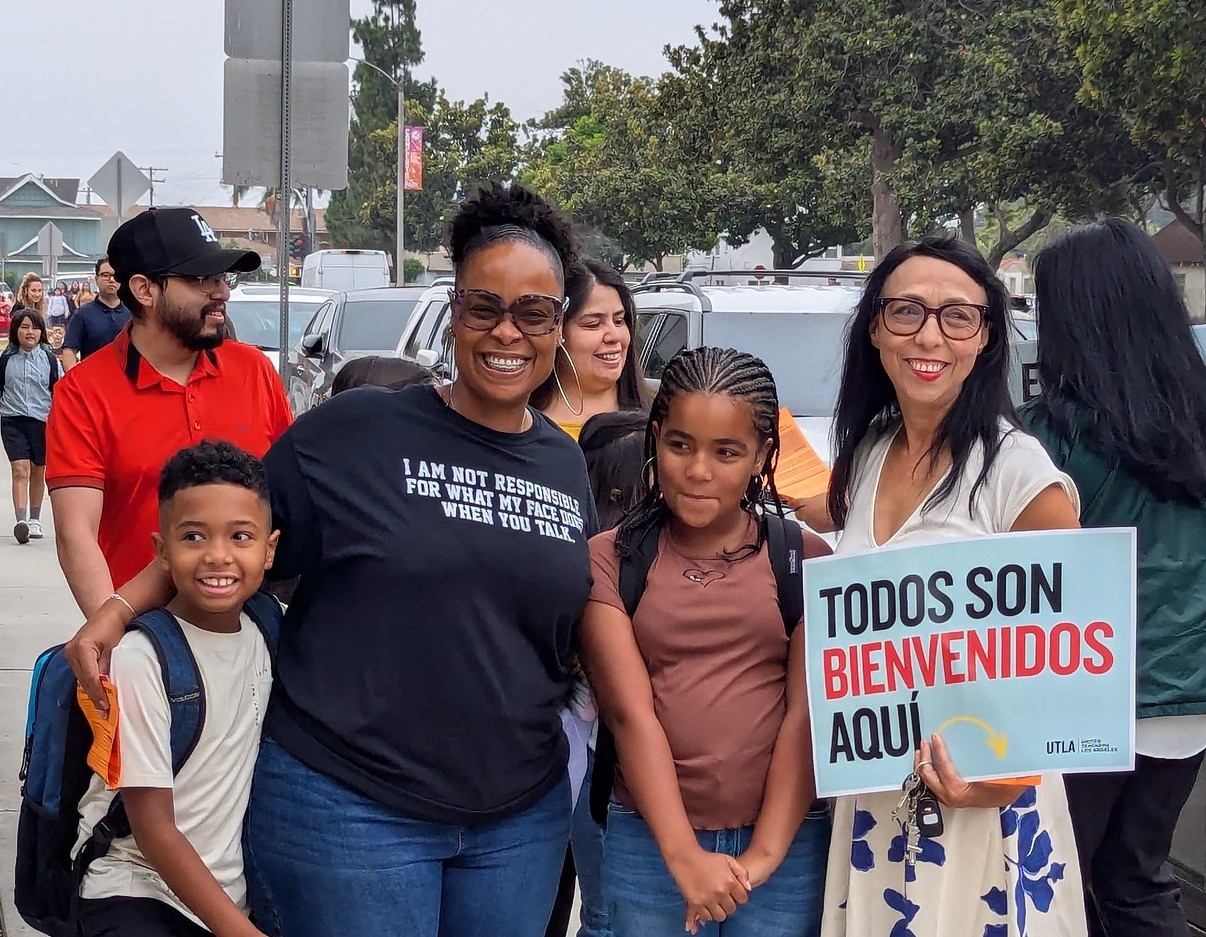
“AS SOCIAL JUSTICE union educators, it is part of our charge to make sure our students feel safe in our classrooms and our families feel safe coming to our schools and participating in our school communities,” says Kyle Weinberg, president of San Diego Education Association (SDEA). “We need to show we will not be intimidated by these threats from this federal administration, and we will stand up for our students because an injury to one is an injury to all.”
Since January, our immigrant communities, regardless of immigration status, have been under assault by federal Immigration and Customs Enforcement (ICE) agents, who have been profiling and accosting people in the streets — sometimes for simply having brown skin or speaking a language other than English — as part of President Trump’s cruel and aggressive immigration enforcement. Masked ICE agents have been conducting raids at churches, in agricultural fields, at supermarkets and outside public schools — like in Los Angeles, San Jose and the San Diego area in August, when ICE agents accosted and harassed people while they dropped their children off at school.
Across California, educators and their local unions have stepped up to protest these actions in their communities and are working hard to ensure all students feel safe, supported and valued in classrooms.

Emily Rogers
“You have to be brave knowing that some people will not agree with you. Some members of our community and even some members of our union are in favor of ICE and what they’re doing,” says Emily Rogers, vice president of Glendale Teachers Association (GTA). “But we try to keep it centered on our students and their families and how this impacts them. We as an association are standing up for our students, our educators and our families. We’re trying to protect our school communities and as teachers and as a union, we want to make
sure we’re doing our part.”

A press conference outside a Glendale hospital in July called on security agents employed by ICE to leave the hospital, where they were monitoring a woman who became gravely ill when she was detained.
Rogers spoke on behalf of GTA at a press conference outside Dignity Health Glendale Memorial Hospital in early July calling on security agents employed by ICE to leave the hospital, where they were monitoring a woman who became gravely ill when she was detained. Despite community objections, these ICE-contracted officers were stationed in the hospital around the clock, creating a hostile and frightening environment for her, other patients and hospital staff. Rogers says GTA will always rise to support and defend students and families from these and any attacks.
“We’ve been dealing with a lot of issues the last few years where our students were in danger, first from extremists and now from ICE,” says Rogers, a 25-year French teacher. “We’re part of the narrative that Glendale is safe for everyone and ICE has no place in our schools or our hospitals.”
Supporting immigrant communities at the bargaining table
In San Diego, SDEA educators are building their demands for protections for immigrant students and educators into their current bargaining platform — making a number of proposals including a new equity article to protect unjustifiably targeted students, dedication of a school district attorney to support and assist immigrant families, establishment of a school district hotline to support families with immigration concerns, and opening an immigrant community legal clinic at one of the district’s community schools.
“As union educators we know that we have the power to fight for what matters to us: Safe, stable, welcoming schools and communities, both within and outside the school doors.”
—San Diego Education Assn. President Kyle Weinberg

Kyle Weinberg
“When we say we’re fighting for stability in our communities, it means we’re fighting for stability in our schools where all students feel welcome and safe,” says Weinberg. “The terror and disruption of ICE enforcement activities create an environment of instability. This is impacting students’ mental health and ability to focus on learning, and that’s why it’s so important to make this a key piece of our contract campaign and what we do as union educators.”
Earlier this year, SDEA printed and distributed “Red Cards” outlining the school district’s policy and protections if ICE agents approach campuses. In August, educators participated in a non-violent direct-action training through their central labor council. Some SDEA members are also taking action with organizations like Unión del Barrio to defend families under attack, regardless of immigration status (see sidebar here). Weinberg says SDEA is working to be prepared for whatever comes, so they are ready when immigration enforcement escalates further in Southern California.
“We want to contribute to strengthening our immigrant rights rapid response network. We’re inspired by UTLA (United Teachers Los Angeles) in collaborating with local community organizations like CHIRLA (the Coalition for Humane Immigrant Rights),” Weinberg says. “We want to partner with community organizations in San Diego to plug our members into larger efforts. We want to be able to serve that critical role.”
While Weinberg says SDEA has worked hard to ensure school district leadership prioritizes protecting students and communities, he knows direct action is needed to defend families under attack.
“We know that we can’t stop at policies on paper and a shared commitment to keep ICE off campus,” says Weinberg. “As educators, we know that what happens off campus impacts our school communities, too. As union educators we know that we have the power to fight for what matters to us: Safe, stable, welcoming schools and communities, both within and outside the school doors.”
Supporting immigrant communities through education and partnerships

In addition to welcoming all students (right), UTLA issued a series of demands to school district administration to create safe schools and support students, families and educators.
UTLA has been in constant action to defend and support Los Angeles’ immigrant communities since the inauguration, building on its work during the last Trump presidency. It has launched an education campaign on L.A. Unified’s sanctuary schools policy, and is building a structure to guide their immigration work and holding a variety of workshops to engage and inform UTLA members.

Maria Miranda
“We have educators in all eight of our areas who are participating in rapid response teams,” says Maria Miranda, UTLA vice president who is leading the union’s immigration defense work. “We held a training series in partnership with CHIRLA. We had a Know Your Rights session with all our members and then opened it up to the community. We had a family preparedness workshop, social emotional supports for students, and we also had teachers present their lesson plans on how to talk to students about what’s happening.”
At their summer leadership conference, UTLA held a series of workshops on immigration-related issues, training members on topics like building a sanctuary team at your work site, developing a safety plan and community self-patrolling. Miranda says UTLA is also working on a plan with community partner Reclaim Our Schools to mark a two-block perimeter around campuses before and after school to create a safe zone and ensure safe passage for students (a 15-year-old student with disabilities was mistakenly pulled out of his parents’ vehicle by ICE agents and detained at gunpoint outside a high school in August). This is in addition to a back-to-school campaign (#WelcomeBackLA) that reinforces that all students are welcome in L.A. public schools.
“As educators, we have deep roots in the communities we serve. Our families look up to us as anchors of our communities and we need to step up to that role and defend when they are under attack,” says Miranda. “It matters that we bring light to what is happening and call out what is wrong. If we have students being pulled out of our schools and feeling unsafe, we’re going to end up with empty classrooms and school closures and serious losses in our school communities. We need to make sure our students do feel safe and we have thriving schools.”
UTLA issued a series of demands to school district administration for the new school year, in addition to contract language proposed earlier this year, on creating safe schools and supporting students, families and educators. These include establishing safe zones around campuses and concrete safety plans, providing food and other basic items to affected families, providing virtual learning options to students who are afraid to attend school physically because of raids, and guaranteeing a pathway to a diploma for students who have been deported.
UTLA members have been outspoken in defending their immigrant students and communities. It’s a personal fight for many, including Miranda.
“I grew up in the community where I taught for 23 years — I see myself in the students and I see my parents in the parents. When I was a child, I remember having to hide when immigration was going door-to-door and I can relate to the fear the community is feeling,” Miranda says. “Working with other folks who have similar backgrounds and some who are DACA recipients — we’re very passionate about this work. Seeing our students every day and knowing that their parents are bringing them to school with all these hopes and dreams being under threat is difficult, but it keeps us going.”
Supporting immigrant communities in our neighborhoods

Alex Vogel
Miranda says it’s important for educators to find what they are comfortable doing to support. Some of L.A.’s community schools started delivering groceries to families who were afraid to leave their homes, which was a way to make an immediate difference. Middle school physical education teacher Alex Vogel did just that in early summer when ICE raids began occurring outside Latino supermarkets in Whittier, causing families to forego trips for groceries, out of fear of harassment based solely on the color of their skin and the language they speak.
“We were very concerned about the lack of food our students and families were going to have,” says Vogel, bargaining chair of Whittier Elementary Teachers Association (WETA). “We knew there was going to be this fear in our communities and there were going to be food disparities.”
Despite attempts to get school district administration and the school board to act, Vogel says nothing was done to support students and families, so he and three other WETA members (and two students) organized a food distribution, distributing four pallets of groceries to local families.
“Families were very grateful, and we had a lot of very positive interactions,” says Vogel. “We worked it out as a drive-through, so they would drive up and we would put food in their trunks. We did it in the school parking lot so that if ICE came, they couldn’t come in the parking lot because they’re not allowed on campus.”
Vogel says that this school year, WETA is organizing and planning on how best to collaborate with district admin, the school board and other organizations to help and protect their school community.
This is what we’re here for — our students and families,” Vogel says. “If there’s a lack of stability in the family because of these outside pressures, then the child is not going to be successful. If there’s financial hardship, food disparities and fear at home, that student isn’t going to be able to learn. It’s part of caring for the community and the people we serve.”
Resources for Educators, Students and Families
OUR UNION BELIEVES immigration policies should guarantee human rights and protect the integrity of the family unit without discrimination; we support immigration policies that keep families together. Regardless of immigration status of students or their parents, every student has the right to a free public education free from harassment.
Visit CTA’s webpage Home Is Here: Supporting Immigrant Educators, Students and Families at cta.org/homeishere for the latest information about current immigration policies and resources and guidance you can use.
You can also order Red Cards that outline our constitutional rights in multiple languages to help you and others defend yourselves against ICE actions, along with posters to express support for immigrants. All these resources can be ordered for free by any CTA member.
Our Union Calls on Colleges to Stop Cooperating with Homeland Security
CTA State Council in early June took a stand against the targeting of college students for exercising their First Amendment rights and expressing political opinions. Our union is calling on all colleges to cease and desist from cooperating with Department of Homeland Security to deport students for their political views. This came in response to numerous international students nationwide being abducted and detained by ICE agents for their political views with the cooperation of the institutions they attend.
Ways to Support Our Immigrant Students and Families
“ Start organizing. Focus on one aspect that’s going to meet the needs of the students with ICE raids happening. Is it providing food? Is it walking students to school bus stops safely? Anything you can do to support students, big or small, is important.” —Vogel, WETA
“ Partner with other unions who might have more resources than you, like NUHW and SEIU, to take action and make a bigger statement.” —Rogers, GTA
“ Ask your school board to adopt policy that establishes protections for our immigrant students and families. Reach out to local community organizations that have experience with immigrant rights defense and access to regional rapid response networks, so you don’t have to figure out everything yourself and can harness the resources that exist in our communities.” —Weinberg, SDEA
“ Advocate and support legislative work to protect immigrant communities. We need to make sure we have bills that protect our schools — even if schools in your area are not under threat, ours are, and we’re going to need support from folks to make those calls to our elected officials.” —Miranda, UTLA
The Discussion 0 comments Post a Comment